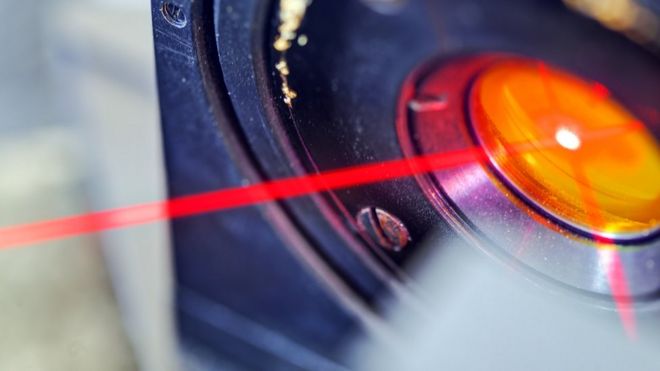Chinese satellite sends 'hack-proof' message
 |
| Lasers help generate a quantum state that changes when anyone eavesdrops on it |
The Micius satellite beamed messages to two mountain-top receiving stations 645 km (400 miles) and 1,200 km away.
The message was protected by exploiting quantum physics, which says any attempt to eavesdrop on it would make detectable changes.
Using satellites avoids some limitations that ground-based systems introduce into quantum communication.
Weak signals
Complicated optics on the Chinese satellite protect messages with entangled photons - sub-atomic particles of light manipulated so that some of their key properties are dependent on each other.
The curious laws of the quantum realm dictate that any attempt to measure these key properties irrevocably changes them. By encoding a key to encrypt data using entangled photons, it becomes possible to send messages confident that they have reached a recipient free of interference.
Ground-based encryption systems that use entangled photons have been available for years. However, the maximum distance over which messages can be sent securely is about 200km. This is because the fibre-optic cables through which they travel gradually weaken the signals.
Repeater stations can boost distances but that introduces weak points that attackers may target to scoop up messages.
By contrast, laser signals sent through the atmosphere or via satellites in space can travel much further before being weakened.
 |
| Signals sent over fibre-optic cables have to be boosted to make it over very long distances |
Data transmission rates possible with satellites are about 20 orders of magnitude more efficient that fibre-optic cables, Jianwei Pan, lead scientist on the Chinese project, told Reuters.
"That, for instance, can meet the demand of making an absolute safe phone call or transmitting a large amount of bank data," he said.
The Micius test was one of several experiments "bringing the concept of a global quantum internet closer to fruition", wrote Robert Bedington, Juan Miguel Arrazola and Alexander Ling in a review article in the journal Nature.
The reviewers said many "challenges" remained to be ironed out before the technology could be widely adopted.
The Micius satellite was launched in August 2015 and the first tests of its laser-based communications system were carried out in June this year.
The satellite is named after the ancient Chinese scientist and philosopher.
China is also working to establish a large ground-based network that also uses quantum communication to protect messages.




0 comments